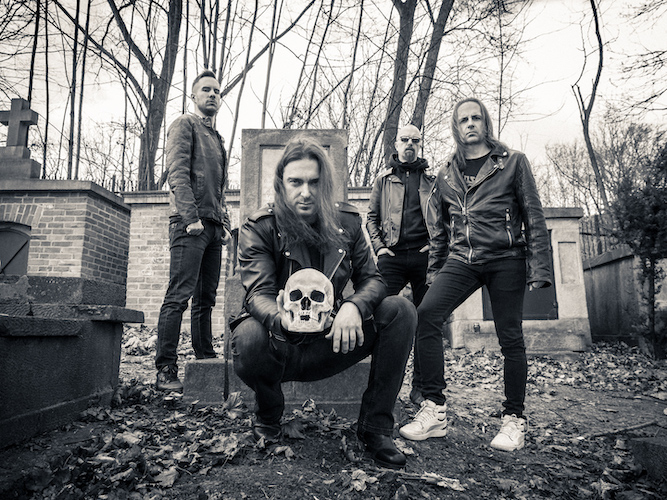
(Last month the Polish “epic doom” crew Monasterium released their third album, Cold Are The Graves, via Nine Records, and that prompted Comrade Aleks to reach out for the following interview.)
I believe that my colleges here will confirm this simple thing: the best reward for our job here is any support we’re able to provide to the bands we’re talking about. And a good interview is a rewarding experience in itself, so it’s easy to return to some bands I interviewed before when they have news to share. Well, that gives an illusion that life isn’t bad in the end and there’s a bright side after all.
Today Monasterium‘s new album Cold Are the Graves brings this silver lining among dark clouds of daily news. This epic doom metal band from Kraków, Poland keeps on providing heroic and triumphant hymns to obscure memories of our past and fantasy realms for nearly eight years, and despite a relatively short career there are three full-length albums in their discography as well as a good reputation due to their dedicated approach to epic doom as it should be.
One of the band’s merits is its stable lineup, because Tomasz Gurgul (guitars), Michał Strzelecki (vocals), Filip Malinowski (bass) and Maciej Berniak (drums) have played together since 2014 (and three of them played before that in the same band, named Sadman Institute). However two are enough to tell the story of Cold Are the Graves, so here are Tomasz and Michał.
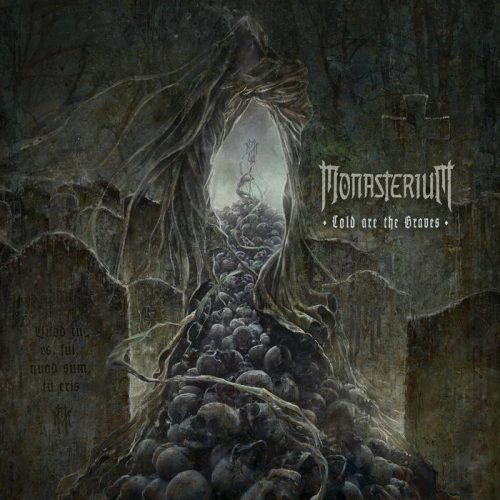
Hi gents! How are you doing? How goes the promotion of your new album Cold Are the Graves?
T.: Hi Aleks! We are fine and really stoked to finally share Cold Are The Graves with doom maniacs all over the world. So far, the album came out on CD and digital platforms, but the vinyl version is also planned in the upcoming months. The promotion itself is going well, reviews are coming in, there’s been a lot of interest on social media, huge spikes on the streaming platforms, so all good.
The album was released a mere few weeks ago, but how long ago was it finished indeed? Did the quarantine afflict your schedule or the schedule of Nine Records?
T: We finalized the recording sessions at the end of 2021 and used the first part of this year to wrap up other pieces such as mixing, mastering, the artwork. It all takes time, but I think we’re still pretty consistent in our releases: 1st album – May 2016, second – May 2019, third – June 2022. As for the quarantine, I believe our schedules were not really affected.
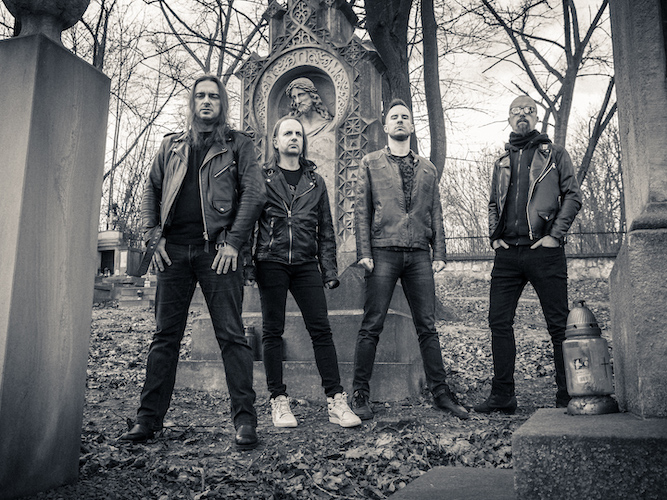
By the way, how do these external factors like the epidemic and the conflict between Russia and Ukraine near your borders affect the band’s creative side?
T: Let’s start with the first part. In a way, the pandemic actually sped up the writing process of the new album. All our concerts in 2020 were canceled and (disappointing as it was), it let us put the primary focus on the new songs. As for Russia’s aggression against Ukraine that you’re referring to, does it really matter how it affects Monasterium‘s creativity? Innocent people are going through an unimaginable horror, losing their lives, families, homes, because of some senseless war that Russia has started. But hey, why don’t we get back to doom in a less literal sense, shall we?
Well, yes, but I guess that many of us – and me as a Russian – were (and still are) damned shocked with that. Such things make you revalue what’s really important in your life. How is Monasterium important for you? Is it a vital thing?
T: I assume it must be really tough for you as well, let’s hope for better times to come soon. And as for Monasterium, it’s super important for all of us. You know, Monasterium is not about becoming popular or making a living out of it, it’s purely about close friendship and music being our passion. We’ve been keeping this ball rolling for 8 years with the same line-up, so that also speaks for itself.
M: Yes, it’s important. It’s the way you express yourself. Focusing on music has always kept me from losing my mind and it’s good to know that you can count on thw people you play with, not only in band matters but life situations as well.
Once again you recorded with Jacek Gruszka in JR Studio. Did this recording session differ from others you had there previously?
T: In the grand scheme of things, it didn’t. We have been working with Jacek since the very first album, we have our own set of practices that work really well, and we don’t feel the need to change anything. Of course, there might have been some subtle nuances. Reorging solos before the vocal tracks were laid down could be an example.
Do you remember your first session in a real studio? Did you have some illusions or ideas about how it should be? You know like… for example, most death-doom fans know about Academy Studio where Mags recorded almost all of My Dying Bride’s albums, but after all it’s not a luxury place, just a studio. And I remember Sentenced’s biography and their stories of drinking heavily in… Tico-Tico Studios? I don’t remember.
T: For Maciej, Filip and myself it was around 2014 when we were recording the very first full-length album by our previous band Sadman Institute. Jacek Gruszka was also involved as well, but only in mixing the album. The tracks themselves were recorded in a studio that belongs to Yanuary from a band named Thy Disease. And I think I might disappoint you here a bit – we don’t really have any crazy or drinking stories coming from that or any other session. Personally, I don’t mind a bit of Jдgermeister, but I wouldn’t risk being hangovered when I need to record my parts. Sorry – not a very rock’n’roll approach.
And as for illusions or ideas, I think it was close to how I envisioned it, but at the same time I did learn a valid lesson then – a studio would verify if you can really play your own riffs like they should be played. So these first sessions made me put much more focus on many different aspects of guitar playing and I feel it’s all paying off now.
M: We have never recorded in a ‘big and expensive’ studio but we also don’t need it. I’m lucky to have known Jacek (our sound engineer) for a long time. He is exceptionally talented and can create good sound in almost every environment. My very first steps with recording vocals were under his guidance so it helped me to feel more confident. However my first studio recording (as a guitar player) was with my first band Sorcerer (no, not the Swedish one). We were young, excited, completely unexperienced, and blindly convinced that we were making a milestone in Heavy Metal!
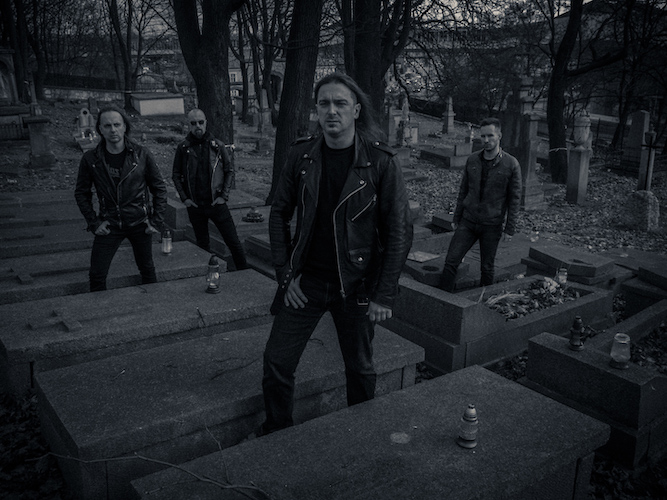
You approach good old metal themes in your songs: plague, myths, fantasy stories, etc. Can you imagine that one day you’ll turn to other topics?
M: Well, good old metal is something I like. I want to keep it traditional. Of course I can’t predict what the future holds and what topics will emerge in our lyrics but I’m pretty sure that they will always be heavy metal-related. You won’t hear in Monasterium about any contemporary problems, politics etc.
Also don’t you think that Monasterium’s heroic and – without any doubt – epic doom metal remains a niche genre due to some conspiracy? We know that there’s only one epic doom band on the top of Doom Mountain, and we respect it, but it’s strange to me every (rare) time when I hear a new album from bands like Capilla Ardiente, Lord Vigo, Monasterium, Procession, or… that band… Eucharist? Ah, Evangelist! You maybe heard of them… So I want to say that it seems to be impossible to break through, even in this genre with its commercial potential, and that’s quite n unfair situation…
T: Epic doom metal does remain a niche. Why? Well, believe me, I wish I knew the answer. Maybe the name of the genre is a bit off-putting, you know “heavy” or “glam” sound a bit more friendly, huh! Anyway, great topic for a much deeper analysis. And as unfair as this whole situation seems, doom metal is our passion and we’re left with no choice but to write the best songs we can.
Does it impact somehow on your ordinary life? Don’t you feel yourself obsolete because of your music tastes? Honestly, I do sometimes, and it’s ok to me.
T: Not so much I’d say. I like to think that my music taste is quite diverse. If you asked me about my most important band, it would be Queen (ok, maybe ex aequo with Black Sabbath). We can chat about classic rock, ’80s pop, grunge, and lots of other genres, so I can definitely find something in common with people who enjoy a bit more popular staff. But of course sometimes it does happen – it can feel a bit weird having to explain what doom is all about and where it comes from countless times.
M: Not really. I feel perfectly fine with who I am and what I like. It really doesn’t matter what the outer world thinks.
There’s a “Necronomicon” song on the album. What makes you return to yje Lovecraftian legacy once more? The metal scene is over-saturated nowadays with this stuff, but honestly it’s still cool to find such references in doom songs.
M: To be honest, I don’t care much about the metal scene. I just like Lovecraft‘s literature – it always mixes perfectly with doom metal, hence referring to the ‘loner of Providence’ writings.
What do you think about modern interpretations of Lovecraft’s legacy, like Alan Moore’s graphic novels or that strange series Lovecraft Country?
M: Lovecraft Country – I enjoyed the series (didn’t read the book though) mostly because of its historical context – the life and struggles of the black community in the ’50s America. I think the author wanted to confront Lovecraft‘s racial views with the real horror that black people went through, however it didn’t work out very well. Throwing the cosmic mythos into these circumstances seemed out of place.
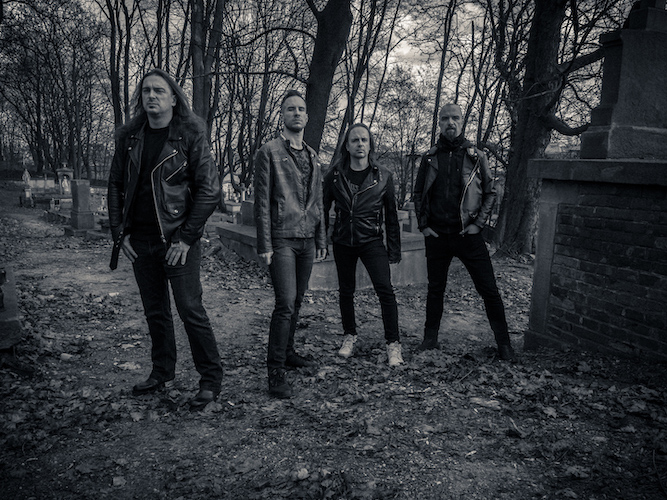
How does epic doom metal benefit your vision of H.P.’s story? Why did you choose this certain theme for your song?
M: Sometimes the lyrics write themselves. Probably the Great Old Ones wanted me to sing about it.
Do you have plans to play live in near future? Do you have any gigs scheduled already?
T: It’d be great to promote Cold Are The Graves with some live shows. Unfortunately, we don’t have anything booked so far. You know, we don’t work with any agencies, nor do we organize concerts by ourselves, and this makes it a bit harder to hit the stage.
Okay, let’s hope that this interview will remind some pious promoters that it’s their sacred duty to support Monasterium. Thanks for the interview gentlemen, any last words for our readers?
M: Thank you Aleks! Hope we’ll meet at a Monasterium gig one day! To all the readers – if you got interested in what we just said, give Cold Are The Graves a spin!
https://ninerecords.bandcamp.com/album/cold-are-the-graves
https://monasterium.bandcamp.com/
https://www.facebook.com/monasteriumdoom
